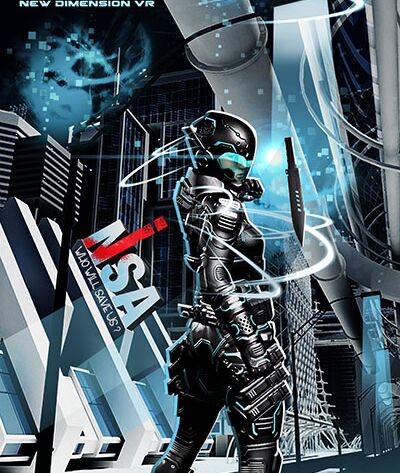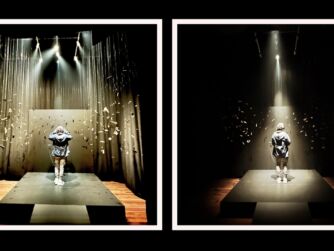
Sky Nite is the CEO of New Dimension VR, and he was at SVVRCon showing Cytopia. Cytopia features a main character inspired by Edward Snowden, and is about the abuses of surveillance and what happens a powerful NSA-like organization gains global control.
Sky talks about some of the limitations of movement that they implemented in order to create a more comfortable VR locomotion solution. In Cytopia, the levels are all designed so that you’re mostly moving forward to minimize the feelings of motion sickness.
Cyptopia also features a character that uses psychic powers in combination with head and hand tracking. One of the VR locomotion techniques and gameplay mechanics that they use is that you can psychically teleport into other people’s bodies, and then use whatever weapons and other items that that person has on their body.
Sky is also the author of the Virtual Reality Insider ebook, which is a great introductory text about the VR industry that provides a fairly comprehensive overview of the VR space. He’s planning on updating it after all of the E3 announcements come out over the next couple of weeks.
Sky is definitely a very animated and passionate evangelist for virtual reality, and you can follow his latest work via his e-mail list on New Dimension VR site.
Become a Patron! Support The Voices of VR Podcast Patreon
Theme music: “Fatality” by Tigoolio
Subscribe to the Voices of VR podcast.
Rough Transcript
[00:00:05.452] Kent Bye: The Voices of VR Podcast.
[00:00:12.014] Sky Nite: My name is Sky Knight. I'm the CEO of New Dimension VR. And we're building a game right now called Cytopia, which is for hardcore gamers. You have psychic powers and you use them to fight the International Security Agency, which is essentially the NSA on steroids.
[00:00:25.318] Kent Bye: Great. So what are some of the interactions that you would have? What is the story and what are you doing in this experience?
[00:00:32.535] Sky Nite: Right, so the game starts out and you're in this cryo tank and you break out and go out and this guy named Ed Rainfield, you might notice the connection there to a certain Snowden, he injects you with something, hands you a little headset, you take it, put it on, and he's like, listen to the person, whatever they say if you want to live, and he runs off. So that's kind of how our first level is going to start. And basically from there, you learn the mechanics. So you have psychic powers. So you basically are going to reach out, click a trigger to lock onto something, and then however you move your arm is going to affect how that object moves. And then the other mechanic we have, when you target a person, you actually switch bodies with them. So you'll find yourself in their body, and if they have a gun or something, you can shoot somebody else or shoot yourself even and return to your own body. Those two mechanics combined allow us to do a lot of interesting play mechanics, especially in VR when I mean everybody wants to feel like they're actually like holding out their arm with the force. So we want to really enable that. In terms of story, this is set in alternate reality so it's kind of a cyberpunk future. The International Security Agency has control of all the nukes in the world. No one really knows that they're super influential in terms of the internet and technology and communication, but really they're effectively acting like the NSA. They're looking at people's data, their sensory information, and so you go with this gang to the undercity, which is a big city built underground with an even bigger city built on top of it with nuclear blast doors in between, and you essentially kind of from this undercity launch this rebellion that causes the overthrow.
[00:02:02.186] Kent Bye: So it sounds like a really interesting thing of like the being John Malkovich, like you're psychically taking over somebody's body or avatar and you're actually being able to see what they have on them. So talk a bit about that, what that feels like to actually experience that in VR.
[00:02:17.808] Sky Nite: Yeah, so definitely it's interesting. Some people who are not really used to VR, if they're trying VR for the first time, they don't really recognize that they've switched bodies. But most of the people who we've tried out who are gamers or have tried VR before, they're like, whoa! They have that reaction where they're like, oh, that's so cool. I'm totally in this other dude's body. and it's interesting like some people ask today how you do this without kind of causing sickness or whatever and basically you do this thing where you do a blink flash which basically simulates your eyelids closing and opening and you know in between you switch bodies and so it just you're suddenly in this other body it feels disorienting in the sense that whoa what just happened but it doesn't make you sick or anything like that and yeah so you basically you know you're looking down and If you have a gun, you can use it. If you have other things, there's a lot of different stuff we can play with. And also, we want to have some problem solving as well within the game. So it's definitely an action game, but we want people to also be using their brains. So I think a good combo of those things is going to be the right way to go.
[00:03:12.413] Kent Bye: Interesting. So it sounds like when we blink, we do it so fast that we oftentimes don't notice it, but you're using that as kind of a locomotion technique to fade to black for maybe a second or less than a second, and then all of a sudden you're in a new body. Did you experiment with that? What worked, what didn't work, what felt comfortable, really tuning that?
[00:03:32.867] Sky Nite: Right, so we actually kind of settled on that almost right away. I'm trying to remember, there was somewhere that I saw somebody mentioning the blink flash, and it wasn't in relation to switching bodies, it was to do with locomotion. And I saw that, I was like, wait, this totally makes sense, this is what we want, we want people to be able to move locations, like teleport, without it being sickening, without it being weird. And so, yeah, we basically tested it as our first thing, and it just happened that it was what worked really well. We may change it a little bit. There is some playing around with the idea of using some sort of graphic thing to show more that, oh, I'm switching bodies. But honestly, I think that the real cool part about it is just being able to switch to someone and then use their body for things and switch back very easily. And so the less of a time differential there is, the more you can really feel like, OK, I'm taking this person over. They're mine now.
[00:04:22.967] Kent Bye: Is that the sole locomotion technique? Or do you have other ways of moving about the world?
[00:04:28.272] Sky Nite: No, so great question. So actually one thing that we've been pioneering, I haven't seen anyone else really doing it, and there's definitely people arguing whether or not, at least that I've talked to, whether it's like a good trade-off, but essentially what we've done is you only use the left stick for movement, and so you can go forwards, backwards, and strafe left and right. And this is obviously at a constant pace, so no acceleration other than instant acceleration. But there's actually no turning. So there's no stick yaw, there's no body turning. It's just always in relation to the level. And what that allows us to do is, if we design our levels so that they're very linear and pretty much as much as possible, you're going forwards, it makes it so that you don't really feel that restricted, even though you can't really fully turn around like people are used to doing in a game. It's actually very comfortable. Out of 200 people tested in a five-minute session, 0.5% got sick. Basically, one person got sick out of 200. So for us, like that, I don't know why. I want other people to be looking at this as a possibility because this is a way you can do an action, first-person-oriented game that doesn't cause motion sickness. And I mean, of course, the trade-off is that you cannot turn. You cannot do things that traditionally in games people are just used to being there. But that's kind of one of the constraints of VR is you have to kind of almost like baby the audience in terms of motion sickness, because most people can't handle it. Like, I can't. I've been using VR for the last year. It still makes me sick if somebody is doing too much acceleration. So yeah, I mean, I think that solution is very, very good for kind of the future of the genre, at least currently. And maybe some people will come up with something new, but I haven't really seen anything. Even the comfort turning is not, it's very immersion breaking. So I'd rather you don't turn than you have comfort turning. I see.
[00:06:11.775] Kent Bye: Because you've done a number of different tests with users was there any additional feedback that they were giving to the game that you had to adapt and change and could have Accommodate that feedback, right?
[00:06:21.058] Sky Nite: Yeah, absolutely. So we built this first demo. It's on actually the oculus share store called size scape CY SCA PE and That was kind of our test demo So I you know, we built it as me and a freelance developer at the time. It was like really just me as the company Since then, I have a co-founder with a lot of experience. But at the time, I built this thing and started testing it, and it changed a lot. We actually had StickYaw in it at first. We were like, oh, it'll be fine. And then it was actually kind of funny. I think it was like three days before John Carmack made the Twitter statement of StickYaw is poison, we had decided that no, no more StickYaw. We're not going to use it. So then he said that. It was a good reinforcement. And basically what we found was as soon as we took out StickYaw, nobody got sick. anymore because they're moving forward, they're moving sideways, they weren't doing the Sikya, like the world wasn't turning around them. So I think as long as people's locomotion doesn't have Sikya, it'll be good. Although one thing we have also tried out is the whole like when you look, wherever you're looking is forward kind of thing. And I know that the guys at Reload were using that for their, Reload being the company making World War IIs. Their system was kind of similar to that, wherever you look is where you go. It causes motion sickness. People want to be able to look around like they do in normal life. When you walk, you don't always walk exactly where you're looking. So it's kind of a little bit unnatural. So yeah, there is no perfect solution right now. But this is kind of, yeah, we did a lot of editing based on feedback. And that's how we basically got to those mechanics that we have now is through the user testing.
[00:07:54.147] Kent Bye: Awesome. And so you also wrote a book called The VR Insider. And so maybe you could talk a little bit about that process of writing a book and putting out a starter guide for people getting into the VR community.
[00:08:05.676] Sky Nite: Right. Yeah. So Virtual Reality Insider, I wrote it last summer. I'm actually going to release a second edition sometime after E3, basically once enough of the announcements are made that it doesn't become irrelevant a month later. But basically that book was self-published through Amazon and book publishing is changing a lot. So I realized that doing something like that was actually viable. We may go with a publisher for the second edition, first thinking about it. But really the goal was to put out something that A, people could read and get a lot of these things like motion sickness and learn about that stuff in a way that was actually not the best practices guide because it's very technical. People like to have Storytelling ideas and that's kind of how people learn a lot better So it was a way for I mean me to also enter the industry as like somebody who was contributing something because you know I wasn't I didn't have a programming knowledge. I've since then have taught myself enough to do some basic building of stuff. But that was my main forte. So that was kind of the way I got into it. And it was really fun. I wrote about 120 pages and then spent the next two months after it was done doing editing and the whole process and formatting and stuff like that. It took me about a month to format the thing correctly. So that was interesting. That was kind of the moment that I left school because I just didn't have time anymore. And just for relevance, I guess, before that I was going to UC Berkeley, so I was actually going to be a senior that year. And then I started the semester having basically just finished the book and realized that there just wasn't enough time for me to focus on the VR company I was building and also finish school. So I cut out the thing that was time consuming and wasn't going to really be as exciting.
[00:09:45.995] Kent Bye: Now, there seems to be sort of a political undertone to your piece. So I'm just curious of some of the deeper intention that you may be trying to get across through this VR experience.
[00:09:55.821] Sky Nite: Right. So one of the things I studied at Berkeley was what I call world systems. So really looking at how ideas flow across society, looking at how economics flows, all these things that basically are macro trends. And that was kind of how I got into VR was like, OK, VR is the future of media. And so really this first piece of content is very much meant to raise people's awareness around the Snowden leaks and about surveillance in general. I haven't seen a good piece of media that's come out that references this government oversight technology. So in the game, the technology they're using is totally possible even right now, even though it's Cyberpunk futuristic, we already have the technology. It's not quite used to the extent that it's used in the game that we're making, but it gives a good kind of example of what could happen if we allow things to just keep going by without actually putting our foot down and saying, wait, Let's talk about this. So I think really the goal with this project is to start, not start the conversation, but to really bring more awareness and more vocabulary to the surveillance conversation. So we're in like pre-production slash production mode right now. Once we finish raising funding for the first level, which is what we're like kind of currently doing, I'm going to spend a month, like the only thing I'm going to do that month is research the Cold War, surveillance, the leaked documents that Snowden put out. And basically from that come to a very clear understanding of the dialogue that we want to put into the game. And so it's not going to be just beating on surveillance, because there is uses for surveillance that are useful and protect us. But there definitely needs to be a lot of pushback to what's currently happening. So really, this first product is a means to continue that conversation and getting more people aware. And then looking at the long term, this is what I'm really passionate about. I am a gamer, so I, of course, love that I'm making games now. But really, it's about sharing knowledge with the world. There's a lot of media companies right now that aren't really exploring what I think, at least, are very thought-provoking concepts. And I think that if there were more thought-provoking pieces of content out there that were well-produced, then people would actually think better. I mean, it's kind of the situation where you are what you read, right? Or what you consume. So, by kind of raising the bar of what people expect intellectually from content, I think that it'll almost be like a new movement of people saying, okay, like, Transformers for whatever like what about this new thing that like goes into these really interesting concepts So that's yeah, that's part of like that's really the core of the under political undertone and I hope that we keep making politically relevant things but also not even just political like also just thinking about things like education and Empowerment all sorts of things that are possible
[00:12:39.339] Kent Bye: Yeah, I think VR as a medium lends itself to handling the levels of complexity that may not translate very well to 2D films, books, movies, even journalism articles that perhaps through the environment you can start to establish these complicated interrelated relationships that you can only really fully comprehend once you've navigated the full environment. It'll be really interesting to see how you have that sort of dialogue between those two sides of the debate, whether it's through characters or whether it's through the enemies that are cracking down. So yeah, do you have any sort of initial thoughts as to whether some of these concepts are going to come out through the gameplay, through the environment, through the dialogue of the characters?
[00:13:20.197] Sky Nite: Yeah, so it's mostly going to be driven by the dialogue and the characters. The environment is definitely related, but it's definitely going to be like, so I mean, at least I have currently a plan. I mean, this could definitely change because, you know, this is a level we're building probably sometime next year. But one of the final levels, you know, there's going to be you know, final villain speech of kind of the ISA director. And he's gonna, you know, through the entire game, you're mostly gonna be focused on screw the ISA, they're the bad guys. And then at the very end, you're gonna kind of be like, oh, wait, what have I done? I've just kind of disposed of this power that controls on nukes. And this guy has spent his whole life thinking in his mind that he's saving the world from itself. And I've just taken that away from him and also from the world. And then it's going to kind of end there with this open question of, well, crap, what's going to happen now? Like, how is society going to keep people safe in a way that doesn't impinge on their rights? And so that's kind of the lead into when we do the second episode, you know, probably sometime 2017. So I think that that's kind of, at least for us, seems to be the best way to go about making people like really heavily into the concept and then turning it on them at the last moment of like, Wait, but you actually have to think. It's not just propaganda. Like, actually think about these issues. Because there is no black or white answer. It's definitely all gray area.
[00:14:35.448] Kent Bye: Awesome. And finally, what do you see as the ultimate potential of virtual reality and what it might be able to enable?
[00:14:42.545] Sky Nite: All right, so it's funny because I listen to your podcast and I always hear that question. I'm always like, oh man, you could go so many places with this. I think that, well, obviously the ultimate potential of VR is, I mean, everyone will be using it as our major computing platform within, I say, 10 years. It'll be like the personal computer, essentially. That being said there's a lot of places that you know if you look even further along with AI and stuff where it could go And it's kind of funny when you start talking about that really high level like it's very hard to comprehend even like you know obviously they're just predictions, but It's not infeasible to imagine a world where people actually enjoy reality more because they're always in VR, because it actually provides a level of experience that is more than you could actually possibly experience in your everyday life. And definitely in terms of people's, like, day-to-day experience, something that VR provides, and not just VR, but, I mean, media in general, is it lets you experience things that otherwise you wouldn't be able to do in your real life. And so, you know, think about the average day in, you know, just like a middle-class worker's life. You know, you go to work, you do work for eight hours, you go home, maybe watch some TV. You're doing pretty much the same thing every day. Your breadth of experience isn't really that wide. If suddenly people, because of VR and the kind of culture that hopefully will evolve where things like basic income, I'm hoping, will be instituted, people will be able to focus a lot more on what they care about and be able to experience all these different realities on a day-to-day basis. Every single day can be a completely different experience. And obviously, there's a lot of content producing to get there. A lot of it will be user-generated as well. Yeah, so I think that ultimate reality is like, people call VR the final platform. Well, we don't really know what the final platform is. Like, there could be something past it that goes, like, multi-dimensional. Like, who knows, right? But I think that VR is kind of the way that we're going to kind of, as a species, all have empathy with each other and be able to really communicate on a one-to-one basis or, you know, one-to-many basis across the entire world.
[00:16:44.101] Kent Bye: Awesome. Thank you.
[00:16:45.161] Sky Nite: Thank you very much.
[00:16:46.842] Kent Bye: And thank you for listening. If you'd like to support the Voices of VR podcast, then please consider becoming a patron at patreon.com slash voicesofvr.




